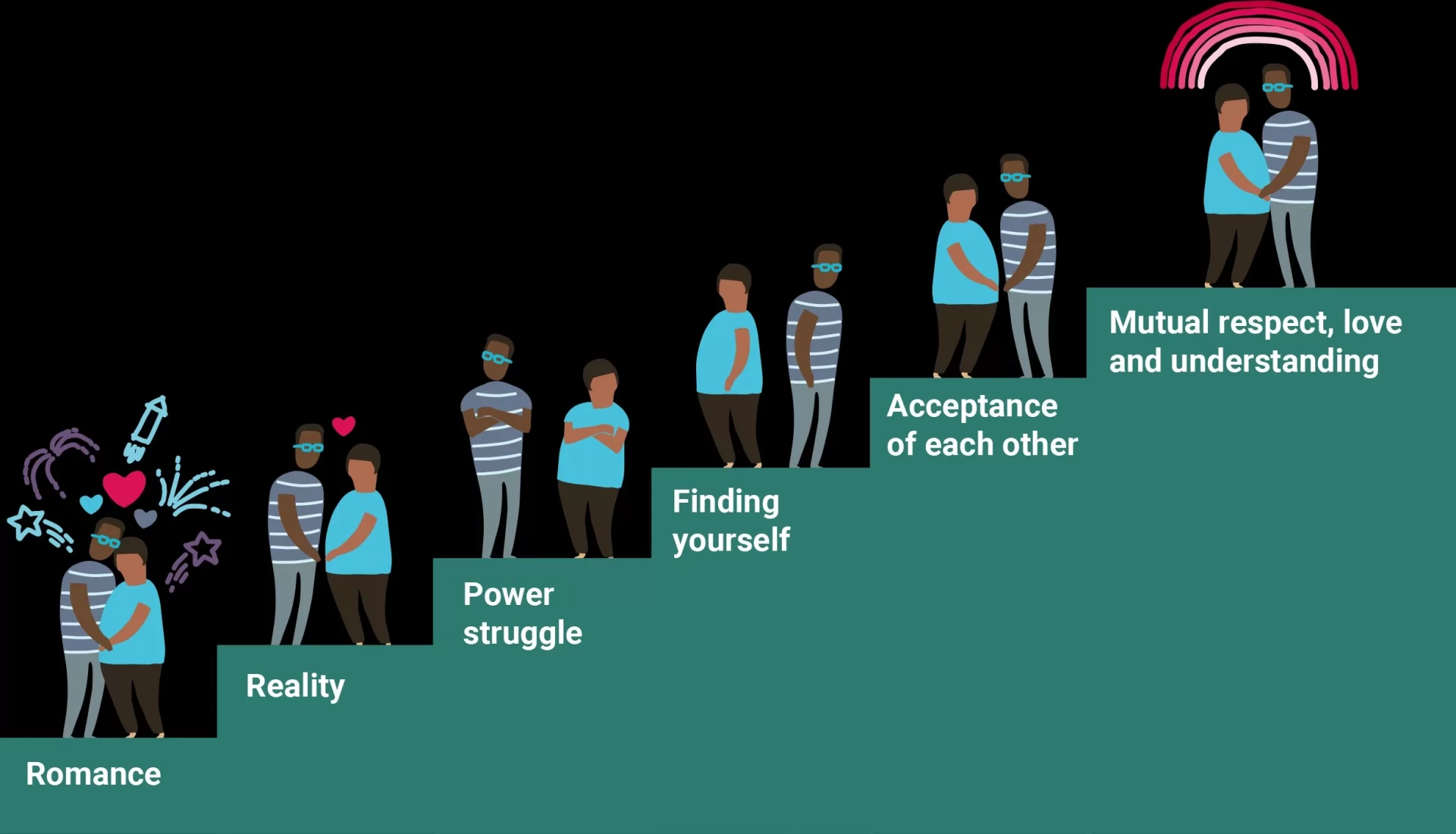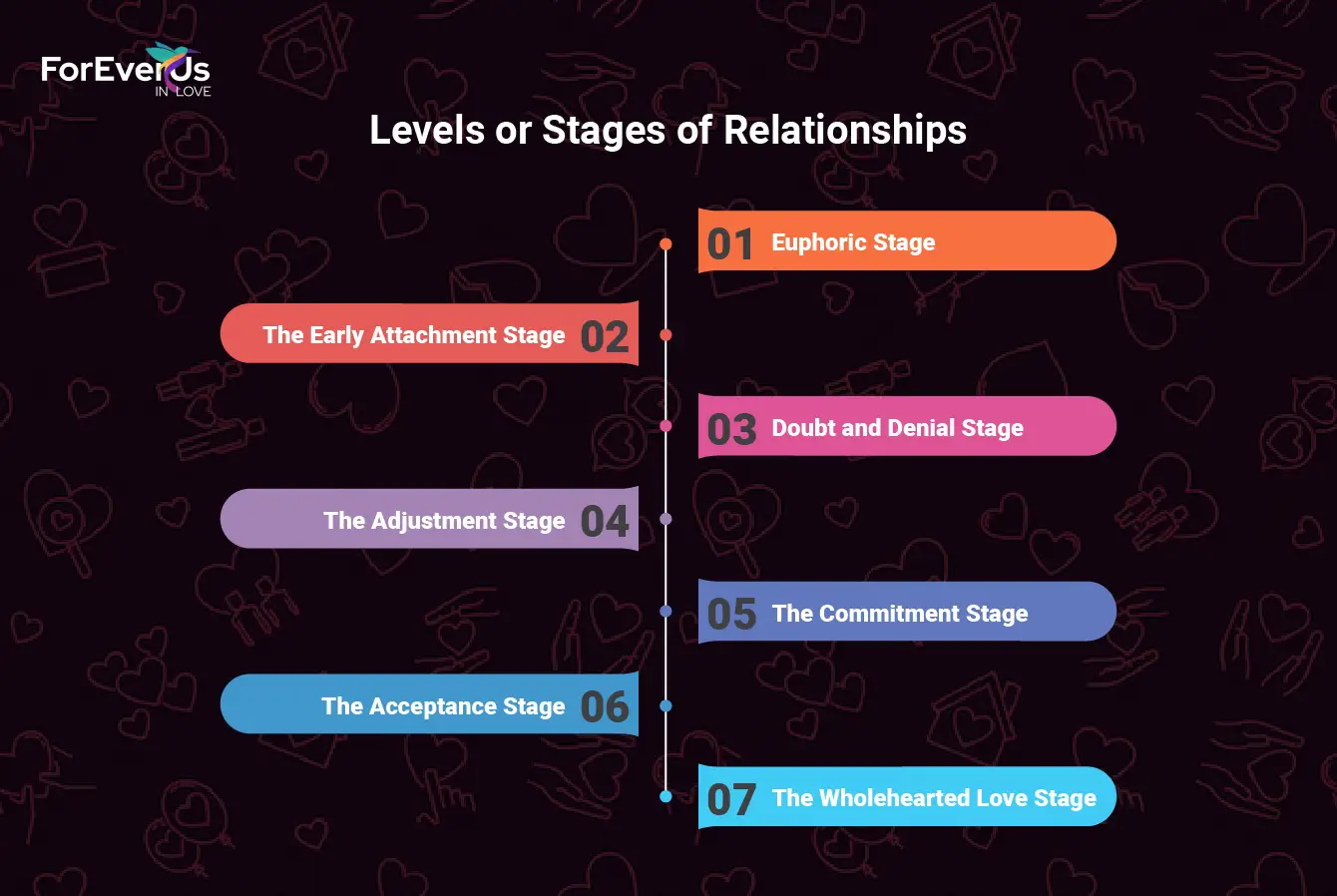Modern relationships seem like a confusing and complex maze of networking, social media, casual acquaintances, and constantly shifting rules and standards, making them quite challenging to deal with in the modern world. Every relationship type, be it a casual hookup, a long-term affair, marriage, or rebound, has its stages and difficulties.
Hence, it becomes crucial when pursuing various goals in life to understand relationship stages to avoid the common pitfalls as we struggle to balance the new world. To nurture any form of relationship you possess, whether short or long-term, understanding the levels of the relationship can help give you more direction toward the right approach to blending your relationship naturally.
Love today is not simply about choosing the right partner and negotiating a compatibility contract. As with every stage in the long process, from attraction through commitment, there are bound to be twists and rough patches. But don’t worry; you are not alone in this course or journey of searching for the perfect woman/man.
Understanding the stages of a relationship and applying critical tips for each stage would put you in a position to gimmick effectively through the complexities of modern relationships and foster a solid and satisfying relationship.
What Are The Seven Stages Of A Relationship? From Initial Spark to Lasting Love
Understanding the various types of relationships is essential, as each type encompasses different stages, challenges, and achievements. Throughout these stages, individuals experience varying levels of hormones that influence the dynamics of the relationship. Recognizing these types and stages can help navigate the complexities inherent in relationships.

Source: Getting On Better Cards
Therefore, whether you are just beginning to date or moving to the next level with someone and want to strengthen your relationship, explore different stages to find out how to succeed in the various levels of relationships.

1. Euphoric Stage
The first stage, the “Euphoric Stage,” also known as the “honeymoon phase,” is marked by overjoy and the next level of excitement. During this phase, couples experience happy emotions and capture each moment as they enjoy each other’s company and try to learn more about each other.
From attraction to improve the partner’s habit of visiting new places to arranging movie nights and whatnot, this stage is characterised by a powerful attraction and an intense focus on the partner’s positive habits, leading to a “Rosy” view of a relationship. Physical and emotional chemistry is at its peak, and partners more often feel as if they are blessed in this fluctuating relationship world where every moment seems perfect, and they are on cloud nine.
However, this stage is relatively transient but necessary to build a strong bond. It is essential for building the foundation of happy experiences and memories, but one should not set unrealistic expectations like those in fables. As time passes, partners also need to be realistic and mindful of their future, where they will face many bumps and many other aspects of the relationship.
Tips for the Euphoric Stage
1. Enjoy the precious moment and novelty of love, but be practical and do not ignore essential aspects of your partner’s traits.
2. Getting lost in excitement is easy, but communicating each matter without hesitation and judgment is also necessary.
3. Remember this stage is often marked as ideal, but be prepared for the uncertainties that arise in the subsequent phases.
2. The Early Attachment Stage
The early attachment stage occurs when the euphoric stage of the romantic relationship is followed by a more realistic one based on security. In this phase, partners become emotionally attached and self-disclose by sharing sensitive information, such as personal background information.
The degree of trust in the couple increases as the couples have meaningful conversations and spend long hours together. This stage of couple growth is characterised by increasing closeness and, to a certain extent, accepting each other’s requirements, demands, and expectations.
This period is crucial as it creates the emotional foundation necessary for the relationship’s longevity. In this stage, partners can look at the relationship in a new light and make arrangements on how they will address the developments that are bound to happen within the partnership, including the partners’ personal growth. The bond that develops during this stage can further strengthen the relationship and equip both persons for whatever comes. However, it can also reveal disparities and possible sources of conflict that require careful and diplomatic handling.
Tips for the Early Attachment Phase
1. Emphasize stability as this characteristic is one of the most important for the business and its long-term success.
2. Understand that this is a transitional period and that both partners must get used to the changes they are experiencing.
3. Talk about the visions and missions, as well as values, in order to create harmony and define closeness.
Communicate Openly with Your Partner to Leave No Room for Confusion
3. Doubt and Denial Stage
The Doubt and Denial Stage may be considered a difficult phase that comes with initial combative behaviors due to confusing stages. Further down the line, as couples grow to know each other better, adversities of some sort or incompatible differences are likely to emerge, causing insecurity. This stage is characterized by doubting the sustainability of the relationship and possibly even negating or downplaying the severity of potential issues.
The partners can develop a fear of commitment or even wonder whether their needs are being met, which strains the relationship. To manage this stage, there must be plain truthfulness in the communication process and self-reflection. In particular, the attitude implying that one or both partners should ignore their fears and insecurities is counterproductive; instead, couples should acknowledge these worries and tackle them directly.
It is possible to solve these issues through constructive conversation and improve the relationship or realize that the differences are significant enough to require a reconsideration of the relationship. This stage is important because actions taken by either partner affect the direction of the relationship.
Tips for the Doubt and Denial Stage
1. Be honest about your insecurities and listen to each other to clear up any false assumptions.
2. Improve matters by coming to a consensus and avoiding the negative aspects of confrontation.
3. Thoroughly assess the emotions incurred and the compatibility of the relationship rather than making hasty decisions.
4. The Adjustment Stage
They faithfully strive to overcome the conflicts and issues that emerge during the doubt and denial stage in the adjustment stage. This period is marked by a conscious attempt to reconcile expectations and behaviors so that they are more compatible with one another. Couples start to implement techniques for handling conflicts, enhanced communication, and a general partnership philosophy for sharing goals.
This stage entails the parties involved agreeing to disagree and seeking to find a middle ground while respecting each party’s positions. In the adjustment stage, it is essential and challenging for both partners to put efforts into enhancing the partnership. It requires reasonable expectations and the construction of effective solutions to new challenges.
Couples can learn how to tackle the problems that hound their relationships to make the necessary arrangements that will eventually lead to the creation of more resilient relationships. This is perhaps the most crucial phase in moving from operations that are centered on mitigating hardships to ones that are focused on optimizing collective harmony.
Tips for the Adjustment Stage:
1. Let each other change and evolve as they go through the different problems they encounter.
2. Try to compromise with issues that both of you do not agree with, but make sure the opinions of both of you are valued.
3. Participate in interactions consistent with rebuilding the couple’s bond and reestablishing a common purpose.

5. The Commitment Stage
The Commitment Stage is a crucial stage that is evidenced in the evolution of a particular relationship. This phase involves active decision-making or mindful decision-making toward a total commitment to each other and the relationship. This phase is characterised by deep commitment and a promise to face the difficulties of life side by side.
It makes partners commit to planning for the future, establishing long-term goals, and becoming integrated into one another’s lives. Thus, the relationship is not only purposeful but also reciprocal, as contrasted with exchange relationships, where the focus is primarily on obtaining personal rewards.
This stage is defined as an understanding of the strengths and limitations of the other partner and a willingness to search for solutions to conflict about the long-term outlook. Love and loyalty are expressed through commitment, and both partners have to invest their efforts and time into the relationship and its development. It is a time of building upon the trust that a couple has for each other and reestablishing that both want the same things for the future, thus building a strong base for the perpetuation of a healthy and happy marriage.
Tips for the Commitment Stage
1. Talk about prospects and goals for further cooperation to see whether the partners have similar visions.
2. Celebrate what has been achieved in the relationship and acknowledge the advancements that have been made.
3. Cultivate your interpersonal relationship with the special someone by keeping in touch and spending time together.
6. The Acceptance Stage
In this stage, couples can accept each other with their strengths and weaknesses without any reservations. At this stage, the couple has gone through various struggles and knows themselves a lot better than way back.
Acceptance means acknowledging the partners’ special characteristics and understanding that they do not need any adjustments. It is a period of tranquillity, satisfaction, and fulfillment in the relationship since both partners feel protected and appreciated.
It is the ability to acknowledge the similarities and yet embrace the differences in the lovers. Acceptance means that not only are partners able to come closer and form strong bonds, but they are also ready to face the future together without any worries or doubts. This stage is critical in the long-run relationship satisfaction because it promotes affection that is genuine and permanent.
Tips for the Acceptance Stage
1. Be kind and respect each other, with no expectation of change in the other person.
2. Cultivate and sustain the bond by remaining consistently engaged in the process of meaning-making and communication.
3. Promote each other actually and genuinely to help each other pursue personal dreams and ambitions.
7. The Wholehearted Love Stage
When reaching the stage of Wholehearted Love, which incorporates the experiences of the previous steps, partners may find themselves in a state of true love based on secure attachment and deep emotional understanding. This is the final stage of relationship marketing, where the customer and provider share equal status, and both parties are content.
Both individuals are actively involved and committed to the development of this kind of relationship that is characterised by mutual support and mutual benefit. Wholehearted Love is derived from the concept of being in love as the entire package of care, respect, and devotion to one another.
This stage represents a very developed form of love when the partners feel complete and in harmony with each other. Love includes commitment, passion, trust, and respect, and both partners work to make the atmosphere of the relationship loving and supportive. This is an affirmation of the fact that Wholehearted Love points to a couple that has grown in the relationship to prove that they can stand firm when faced with problems as well as jubilate when in a position to embrace happy moments together. It represents the pinnacle of love, not just as a passing phase but as a profound and sustainable bond.
Tips for Wholehearted Love
1. Appreciate your long journey and celebrate your relationship with the partner you love and adore the most.
2. Kee explores new places, finds new hobbies, and grows as a couple, keeping a sense of excitement and connectivity.
3. With mutual effort and interest, remember that your relationship remains a core and cherished part of your life where there is no place for dislike ness and ego.
As you go through the different stages of a relationship, make sure that each stage plays an important role in making the overall relationship strong. Whether it is the stage of dating or experiencing the depth of mature love, embracing different stages of a relationship with love, enjoyment, and mindfulness will make your relationship prosperous.
Quick Tip
Keep doing exciting, novel things such as exploring new places, cooking together, etc., to keep the spark alive and help each other grow over time. You can also celebrate days in a special way to rejoice in the love and bond you share.
Tips to Keep Love Alive Forever
Maintaining a strong and lovable relationship requires mutual interest, effort, understanding, and much more. According to the study, passion, intimacy, and commitment are the three core components of love, and almost 8 in 10 people admitted that they married because they were in love.
Here are some of the essential relationship tips and advice that help the couple keep the flame of love and trust bright throughout all the phases :
1. Don’t Overlook Communication
- Talk Regularly: No matter how busy you are, talk regularly with your partner and share your feelings, needs, and opinions to overcome some silly issues.
- Active Listening: Listen to your partner’s words without judging or giving any biased solution.
2. Appreciate
- Express Gratitude: Cooperatively, acknowledge the activities and attributes of your partner frequently.
- Small Gestures: Things like writing a nice message on their door when they are in the shower or making them their favourite food when they are expecting something else can be quite effective.
3. Maintain Physical Intimacy
- Affection: Physical contact is important and can include holding hands and hugging in addition to intermittent touching to emotionally bond.
- Quality Time: Take time to create and spend quality time together, not merely sexual contact but meaningful touches.
4. Support Each Other’s Growth
- Encourage Dreams: Work on achievements of personal and professional plans and share in success.
- Adapt Together: Be accepting of transformations in each other and make adjustments to tackle the vicissitudes of life.
5. Keep the Romance Alive
- Date Nights: Maintain a certain degree of space where you both can make an effort to remember specific dates or events that will give you time to come together and celebrate something that is not connected to the daily monotonous.
- Surprises: It is recommended that about 70% of your daily interactions with your partner should be deliberate and positive, while 20% should be spontaneous and 10% unplanned.
6. Resolve Conflicts Constructively
- Stay Calm: Always embrace conflicts with a positive attitude, to find solutions rather than conquer them.
- Seek Solutions: Cooperation was focused more on finding a reasonable resolution for the issue than assigning fault. </li.
7. Build a Strong Foundation
- Shared Values: Make sure you and your partner are on the same page when it comes to your values and vision for the future.
- Trust and Respect: It’s important to maintain the level of trust and respect in the relationship all the time.
Can Couples Therapy Save My Relationship?
Couple therapy is a transformative process that offers support and assistance to couples and individuals who are open to bringing change in their lives.
Couple therapy is highly beneficial for both partners in nurturing and establishing a healthy relationship. It offers a safe and healthy environment for partners to express their feelings and grievances openly without being judged and feared. Through couple therapy or counseling, partners can gain confidence that their issues are being heard and understood by the therapist, letting them reflect and share their emotions more deeply.
If your relationship is struggling and about to give up, go through the below benefits that couple therapy brings to your table such as:
- Evolve your relationship dynamics
- Create a safe place for a couple
- Start to see each other’s perspective
- Begins to solve relationship roadblocks
- Restore trust
It is impossible to predict how many sessions will be needed to mend a relationship; the number depends on the type and intensity of issues, how willing each partner is to participate in the process, and how well the therapeutic methods work. While some couples may need more intensive therapy over a longer period, others may notice major improvements in as few as a few sessions.
Key Takeaways
Nurturing a relationship and keeping that spark alive through different stages is important. Understanding the five love languages can be a valuable tool in this journey. Every relationship is different, and the status of that changes with time. It is completely fine that you don’t feel exactly like you did in the dating stage.
When there is disagreement, always remember to look both internally and outward at each other. Any relationship will inevitably have conflict; it’s not a warning that things won’t work out. Rather, cooperate to resolve the issue. Your relationship may be now even stronger and healthier than it was previously.












